 Image search results - "taga" Image search results - "taga" |

Hanegi Park is near Odakyu Umegaoka Station ("Umegaoka" means plum hill). 小田急梅ヶ丘駅
|
|

PR poster designed by Tetsuo OshiroPoster for the race.
京都大学ボート部OBの尾城徹雄様に作成したポスター。大学内や大津市石山商店街などで張り出された。
|
|

Entrance to Hanegi Park's plum grove
|
|

Karahashi Bridge as the starting point for alumni races
|
|

The plum trees are on a small hill.
|
|

Hanegi Park has plum blossoms in mid-Feb. to early Mar. It has about 700 plum trees and also sports facilities and public library.
|
|

Kyoto Univ. in dark blue T-shirts
|
|
|
|
|
|

Finish line 300 meters later
|
|
|

Tokyo Univ. (Todai) crew return to land after a race
|
|
|
|
|

On July 29, 2007, this regatta was held for the second time. It targets mainly beginner rowers. Organized by the Seta Rowing Club which seeks to have more people enjoy water sports on Lake Biwa. Seta-Karahashi Bridge was the regatta's starting line. The Lake Biwa Rowing Song CD was awarded to all the 1st, 2nd, and 3rd place winners in all five categories.
|
|

Picnic area
|
|

Held during Aug. 3-5 at Taga Taisha Shrine, the Mantosai or 10,000-Lantern Festival is a night festival when numerous lanterns are lit within the shrine grounds. The lanterns are for the repose of ancestral spirits.
|
|

Way to Tagata Shrine from Tagata Jinja-mae Station. Shrine famous for numerous phallic objects used as offerings to the gods. The 1500-year-old shrine worships a deity called Tamahime-no-Mikoto who was a daughter of a powerful local lord from the 5th c.The Honen-sai or Honen (Hounen) Matsuri is held by Tagata Jinja on March 15 to pray for an abundant harvest. "Honen" literally means "Year of abudant harvest." Since a giant penis is used as an offering, it is popularly called the "penis festival."
The shrine is near Tagata Jinja-mae Station on the Meitetsu Railways' Komaki Line. From Shin-Nagoya Station or Shin-Gifu Station, go to Inuyama Station and transfer to the Komaki Line.
|
|

Tagata Jinja-mae Station on Meitetsu Railways' Komaki Line, a few stops from Inuyama Station. The shrine is a 10 min. walk from the train station.
|
|

Univ. of Tokyo alumni crew in light blue T-shirts
|
|

Sixty rowing teams (300 people) rowed in five categories, including beginner and expert rowers, ranging in age from junior high to senior citizens.
|
|

Stone monument for "Haru no Tsuki" haiku poem by Nakamura Teijo. 「春の月」中村汀女
|
|

Taga Taisha Shrine torii near Taga Taisha-mae Station. MAP
|
|

Festival spectators come by the busload, including people from US military bases such as Yokota.
|
|

Tagata Shrine torii and entrance 田縣神社
|
|

Kyoto Univ. alumni crew in dark blue T-shirts
|
|

This is the boat dock where people got on and off the boats. The boats were provided by local rowing organizations. The regatta was organized by the Seta Rowing Club in Otsu.
|
|

Stone monument for "Haru no Tsuki" haiku poem by Nakamura Teijo. 「春の月」中村汀女
|
|

Road to Taga Taisha Shrine
|
|

Entering Tagata Shrine, dedicated to Tamahime-no-Mikoto (daughter of a local feudal lord) and Mitoshi-no-Kami (deity of harvests).
|
|

Tagata Shrine stone marker
|
|

Kyoto Univ. alumni crew at start line
|
|

A rowing team leaves the dock for Seta-Karahashi Bridge seen in the background.
|
|
|

Homes along the way are decorated.
|
|

Various entertainment is staged within Tagata Shrine up until the procession starts at 2 pm.
|
|

Mikuji paper fortunes for love and romance, marriage, and childbirth.
|
|

On Karahashi Bridge
|
|

Seta-Karahashi Bridge, the start line.
|
|
|

Near the shrine entrance are the usual food stalls.
|
|

Schedule of events and procession route. In odd-numbered years (like 2007), the procession starts from nearby Kumano-sha Shrine. In even-numbered years, the procession starts from Shinmei-sha Shrine.
|
|

Tagata Shrine Honden main hall. Komaki, Aichi Pref.
|
|

Race starts for Kyoto Univ. alumni
|
|

Up to four rowing teams raced down a 250-meter straight course.
|
|

Weeping plum blossoms
|
|
|
|

People line up to rub the sacred balls. Penis rock in the foreground.
|
|

Tagata Shrine Honden main hall which worships shrine worships a deity called Tamahime-no-Mikoto who was a daughter of a powerful local lord from the 5th century.
|
|

Kyoto Univ. alumni
|
|
|
|
|

Welcome to Taga
|
|

Sacred Balls. Put in money and rub the left and right ball for family safety, business prosperity, safe childbirth, etc. 珍宝窟
|
|

Torii to Oku-no-miya Shrine, next to the Honden main hall.
|
|

Kyoto Univ. starts to veer off course
|
|
|
|

Taga Taisha Shrine torii
|
|
|

Stones and Oku-no-miya Shrine
|
|

Kyoto Univ. is unable to correct their misdirection
|
|

All the boats are held stationary with a rope provided from the bridge.
|
|
|

Mantosai sign under the torii
|
|

A faulty rudder runs them aground
|
|
|
|

Flower pair
|
|

Arched bridge leading to shrine gate.
|
|

This is what you see inside Oku-no-miya Shrine. A giant wooden phallus offering.
|
|

4-man crew alumni boat race
|
|
|

Near park entrance
|
|
|

Oku-no-miya Shrine also has many other phallic objects presented as offerings. There even one which you can touch...
|
|
|
|
|

Apparently it can become erect too. (Compare with previous photo.)
|
|
|
|
|

Phallic objects
|
|

8-man crew alumni in their 20s and 30s at starting line
|
|

Most races were not close.
|
|

Kids carrying mikoshi portable shrine. They went to the train station.
|
|

Note that the phallus is not the object of worship. It is an offering to the god.
|
|
|
|

Taga Taisha's lanterns come in five sizes. Each one represents a donation. The donar's name is on the lantern. The biggest lantern requires a donation of 20,000 yen.
|
|
|
|

Kyodai alumni in their 20s and 30s
|
|

The 250-meter course is very short, and each race ends within a minute or two.
|
|

Each lantern is lit with a small lightbulb. (No candles)
|
|

Votice tablets written with people's wishes for love, sex, and babies.
|
|

Kyodai alumni in their 20s and 30s
|
|

Finish line. In the background is the Kyoto University Rowing Club's boat house.
|
|

Festival schedule, starting at 5:30 pm and ending after 9 pm.
|
|

Place to rub the sacred balls. 珍宝窟
|
|

One of the main events, the 4-man boat race between Todai and Kyodai on a 3200-meter course.
|
|
|
|
|
|

Todai's 4-man crew in the lead
|
|

The race had to be stopped for a few minutes each time this cruise boat passed by.
|
|

Approaching the main shrine hall.
|
|
|
|

Kyodai's 4-man crew try to keep up
|
|

The Lake Biwa rowing Song CD was also sold.
|
|

These lanterns above are the smallest ones, requiring a donation of only 1,500 yen. They are the most numerous.
|
|

Rub the two balls.
|
|

Todai's 4-man crew rowing
|
|
|

Main shrine hall
|
|

Put in money and it will make a "chin" sound. (From the word "chinpo" for penis.)
|
|

Kyodai's 4-man crew rowing
|
|

The Lake Biwa rowing Song CD was also sold during the regatta which lasted from 9 am to 4 pm.
|
|

These lanterns hanging in the main shrine hall must be the most expensive ones.
|
|

Phallic fence posts.
|
|

Kyodai's 4-man crew rowing with dark-blue blades
|
|

CDs
|
|

The shrine also recently got its roof rethatched. The roof looked spanking new.
|
|
|
|

Todai won this one.
|
|

Sketch of regatta course
|
|

As evening approaches, the crowd increases.
|
|

Phallic rock. There are several phallic rocks donated by various people. Apparently they are either natural or carved.
|
|

Main race: 8-man crew for Todai and Kyodai coming round the bend on the 3200-meter course
|
|

Dragon boat
|
|

Torii with lanterns lit
|
|

Best-looking phallic rock.
|
|

Dragon boat
|
|

Gate to shrine
|
|
|

Free rides on this dragon boat were also provided.
|
|

Kyodai is clearly in the lead
|
|
|

Female and male rocks.
|
|

Kyoto Univ. rowing to victory
|
|

Dragon boat
|
|

Direct path to Taga Taisha Shrine hall
|
|

Behind the rocks are two trees bonded together.
|
|

Rowing on the dragon boat
|
|

Lanterns at night
|
|

Another pair of trees bonded together.
|
|

Univ. of Tokyo rowing
|
|

Dragon boat going to the Seta-Karahashi Bridge.
|
|
|

And another...
|
|

Kyoto University's winning rowing crew
|
|
|
|
|
|

Carrying the boat back
|
|

A taiko drummer sits at the front of the dragon boat.
|
|
|
|
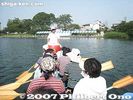
We rowed according to the taiko drum beat.
|
|

View of Seta River race course, Karahashi Bridge on far left. Tokyo vs. Kyoto Univ. Regatta
|
|

Awards ceremony
|
|

Entertainment on stage
|
|

Worst-looking phallic rock. That's stretching the imagination a little too much.
|
|

Kanpai!
|
|

Writing names on award certificates.
|
|
|

Votice tablet with illustration of the Honen Festival.
|
|

Alumni race starting at Seta no Karahashi Bridge
|
|

Celebrations
|
|

Some of the prizes awarded to the 1st, 2nd, and 3rd place winners. Notice the Lake Biwa Rowing Song CDs (75 copies).
|
|

Entertainment with a dragon dance
|
|

Phallic souvenirs.
|
|

Body tossing
|
|

Awards ceremony
|
|
|
|
|

Celebrate by jumping in the water
|
|
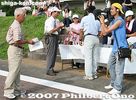
A representative from each winning team went to receive a medal and Lake Biwa Rowing Song CD. Each team had 5 members, so 5 CDs per team.
|
|
|

Singing "Lake Biwa Rowing Song" (Biwako Shuko no Uta)
|
|
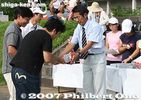
The Lake Biwa Rowing Song CDs were donated by Philbert Ono.
|
|
|

Singing "Lake Biwa Rowing Song" (Biwako Shuko no Uta)
|
|
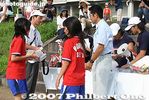
The junior category team receive their medals and CDs.
|
|
|

Singing "Lake Biwa Rowing Song" (Biwako Shuko no Uta)
|
|

Dragon dance
|
|

The beautiful 15-page program included an ad for the Lake Biwa Rowing Song CD.
|
|

View of Seta River race course from Karahashi Bridge
|
|

Truck to carry the boats
|
|
|

Shishimai lion dance
|
|

Lantern-lit path to Taga Taisha
|
|

Portable shrine for Takeinadane-no-Mikoto
|
|
|

The route is short, but it's a slow procession with many short breaks. The procession lasts 1.5 hours.
|
|

Takeinadane-no-Mikoto
|
|

The first half of the route is quite narrow.
|
|

Sake cart
|
|

Salt sprinkler heads the procession to purify the way.
|
|

Todai and Kyodai coming round the bend
|
|

Sarutahiko-no-Okami, the deity who led the descent of Amaterasu (Sun Goddess) from heaven to earth.
|
|
|

Branches of the sacred sakaki tree.
|
|

Kyoto Univ. goes on to win the main race of the day in 10 min. 11 sec., over 20 sec. ahead of Todai.
|
|

Not sure what this is.
|
|
|

Drum
|
|
|

Finally on the main road to Tagata Shrine. Half the road is blocked off for the procession.
|
|

On the main road.
|
|
|
|
|

By this time, all the men are filled with sake and gregarious.
|
|

Entrance to Tagata Shrine crowded with people waiting for the procession to arrive.
|
|

Tagata Shrine crowded with people waiting for the procession to arrive.
|
|

Tagata Shrine crowded with people waiting for the procession to arrive.
|
|

Salt sprinkler enters first.
|
|

Sarutahiko-no-Okami
|
|

The standard-bearer with a banner of shunga-style penis painting.
|
|

Banner of shunga-style penis painting.
|
|

Women spectators touch the penis for good fortune and to become fertile perhaps?
|
|

The phallus is a symbol for themes of fertility.
|
|

Palanquin for Deity of Harvests
|
|
|

The giant penis also arrives at the shrine as it spins around behind the
|
|

Giant phallus makes its way to the shrine.
|
|
|
|
|

The giant phallus in front Tagata Shrine's Honden main hall.
|
|

Portable shrine for Takeinadane-no-Mikoto
|
|
|
|

Portable shrine for Takeinadane-no-Mikoto enters the Honden main hall.
|
|
|

Now comes the giant phallus heading for the shrine's main hall.
|
|
|
|

Penetration successful. This is 3:30 pm.
|
|

Carried by men singing kiyari laborers' songs, the smaller wooden phallus also goes to enter the shrine's main hall.
|
|
|

Installed inside the shrine's Honden main hall, the new giant penis will replace the old one.
|
|

Tagata Shrine grounds during the Honen Festival.
|
|

Tagata Jinja banners.
|
|

Ema votive tablet with giant penis portable shrine. 500 yen.
|
|
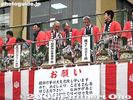
At 4 pm, the festival's final event is the mochi-nage or rice-cake tossing. First, they warn eveyone that the shrine won't be liable for any injury you might incur from this. And the elderly and children should avoid this mochi-nage.
|
|

A large crowd tries to catch numerous mochi which are hard and can be dangerous if it hits you on the face or head. To avoid injury, do not look down and don't try to pick up mochi on the ground. You can get trampled, and most injuries occur this way.
|
|

Pregnant women also attend the festival. As well as mothers with a young baby coming to give thanks.
|
|

The usual penis souvenirs on sale.
|
|
|
|

Sake flask
|
|
|

Demure-looking woman figurine looks deceiving until you look at the bottom...
|
|
| 908 files on 4 page(s) |
1 |
 |
|